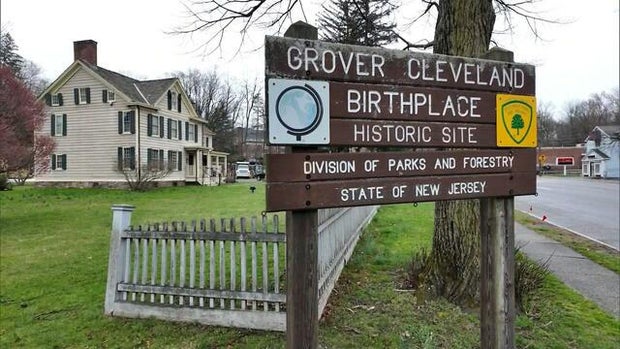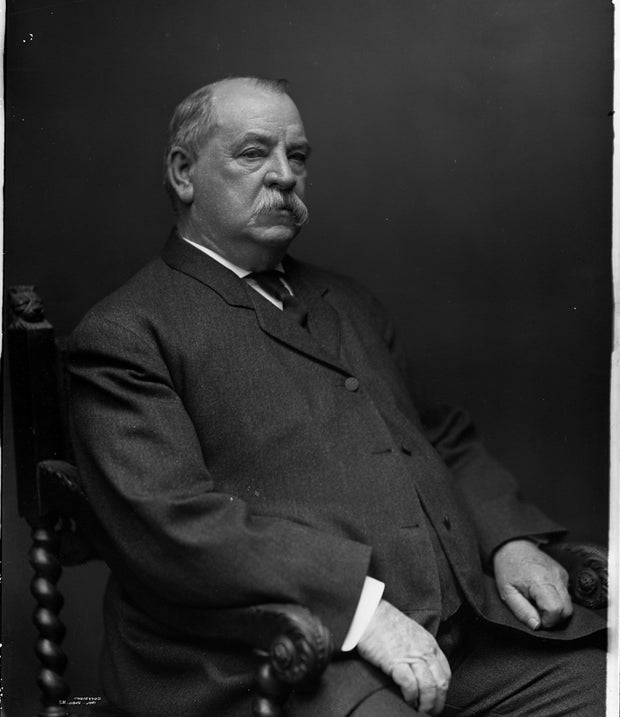For more than a century, President Grover Cleveland was in a league of his own as the only leader of the nation to serve non-consecutive terms as the 22nd and 24th president of the U.S. Now, Cleveland shares that honor with President-elect Donald Trump, who was the 45th president of the U.S. and will soon take office as the 47th. But in Cleveland’s hometown, locals still want to preserve his legacy.
Cleveland was born the fifth of nine children in Caldwell, New Jersey, about 20 miles outside of New York City. His humble home was near the Presbyterian church where his father was a pastor. Now, his birthplace is across the street from a gas station and donut shop, and it remains a tour site — though some days, no one comes to visit, according to tour guide Sharon Farrell.
Nationwide, there’s little to mark Cleveland, except for a rest area off the New Jersey turnpike. But in Caldwell, he’s still inspiring some residents.
“How could you not be inspired?” said Carlos Pomares, who said that Cleveland was his inspiration to run for a local country commission. “The guy had a meteoric rise in a matter of four years, based on just being a hard worker, honest, brutally honest at times, and being one who just stuck to his beliefs.”
CBS Saturday Morning
Pomares’ home is filled with Cleveland-related pieces of history, including ribbons, busts and a Grover Cleveland brandy bottle. Throughout the town, there are multiple places named for the former president, including apartments, a park and a middle school. There’s even a parking spot reserved for him.
Cleveland didn’t spend his whole life in Caldwell. During the middle of his life, he was a lawyer in Buffalo, New York, living in a small apartment above his law practice, according to author Troy Senik, who wrote “A Man of Iron,” a biography chronicling Cleveland’s life. Later, he would be the mayor of Buffalo and the governor of New York.
Cleveland’s two presidential terms
Even before his run for president, Cleveland was seen as principled and ethical. He was drafted by Democratic party bosses to run for president amid an era of corruption, patronage and unethical powerbrokers, and took office for the first time in 1885. He made history, but not headlines.
“If you’re looking at the late 19th century, if you’re looking at the Gilded Age, the debates are about tariffs. They’re about silver in the money supply. They’re about pensions for union veterans. We don’t know how to think about any of these things,” Senik said. “It’s not exciting stuff.”
Cleveland lost his re-election race to Indiana Republican Benjamin Harrison in 1888, though he won the popular vote. He was initially content with his retirement and “somewhat relieved,” feeling that “he had done a decent job in his first term,” according to Senik.
Oscar White/Corbis/VCG via Getty Images
But in 1892, he was again pressured by party leaders to run. He narrowly vanquished Harrison and moved back into 1600 Pennsylvania Avenue — something his wife, who he married during his first term, always believed would happen.
In the final days of Cleveland’s first term, Frances Folsom told “a member of the domestic staff in the White House ‘Make sure that you pack up everything very carefully because we want it to be just where we remember it when we come back,'” according to Senik.
“The staffer assumes that they’re planning to visit in the Harrison administration. ‘Mrs. Cleveland, when will that be?'” Senik said. “And she said, ‘We’re coming back four years from today.'”




